Translate point (x,y) 11 units down. Rewrite the ordered pair to describe the translation.
(x,y-11)
DOUBLE POINTS
Describe the transformation that creates Figure FGHIJ from Figure ABCDE.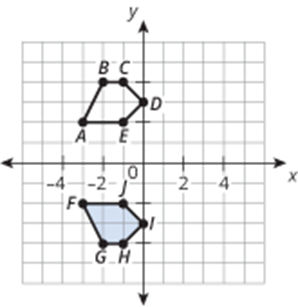
Figure ABCDE reflects across the x-axis.
Describe the transformation used to map triangle triangle GHI onto triangle DEF? 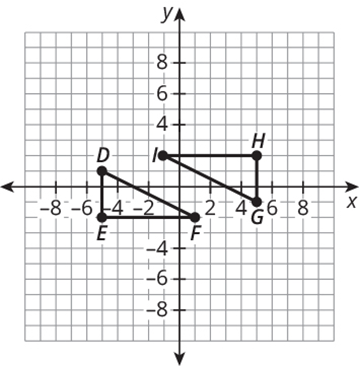
A rotation of 180 degrees around origin (0,0).
Identify whether the statement is true or false, if false, correct the statement.
True
Triangle RUG ≅ Triangle CAR. Identify all of the congruent angles.
<R ≅ <C
<U ≅ <A
<G ≅ <R.
If the triangles are congruent, write the transformation you can use to map one onto the other. 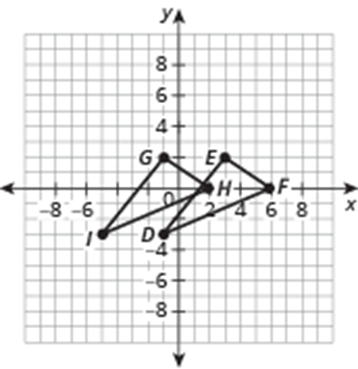
Translate triangle EFD 4 unites to the left.
Dianne drew a triangle with coordinates (1, 3), (3, 2), and (4, 2). She drew an image of the triangle with coordinates (–1, 3), (–3, 2), and (–4, 2). How did she make the image?
TRIPLE POINTS
She reflected the original figure over the y-axis.
180
A rotation of 180 degrees can be rotated either clockwise or counterclockwise and end up in the same position.
True.
Which of the pictures are congruent to the picture shown? Justify your response for double points.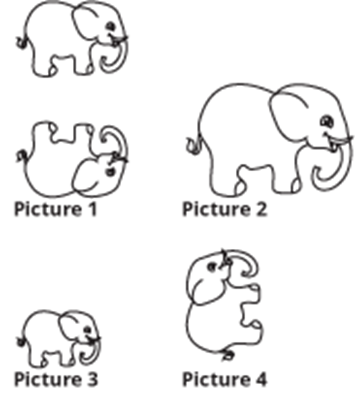
Picture 1 is congruent and a reflection.
Picture 4 is congruent and a rotation.
Pictures 2 and 3 are not congruent because they are not the same size as the original image.
Regina drew a triangle with vertices at (1, 2), (3, 3), and (4, 1). She slides the triangle 2 units down to create an image. What are the vertices of the image?
(1, 0), (3, 1), and (4, –1)
Describe how (x,y) are changed by a reflection across the x axis.
Describe how (x,y) are changed by a reflection across the y axis.
x-axis (x,y) changes to (x,-y).
y-axis (x,y) changes to (-x,y).
Parallelogram KLMN has vertices K (-4,6), L(-2, 6), M (0,4) and N (-2, 4) Parallelogram PQRS has vertices P (4,-6), Q (2,-6), R (0,-4), and S(2,-4).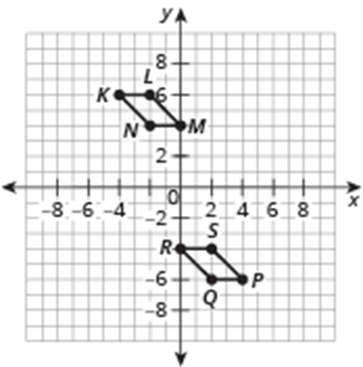
I can rotate paralleolgram KLMN 180 degrees about the origin.
A 90 degree counter clockwise rotation about origin (0,0) changes the coordinates of an ordered pair as follows:
(x,y) changes to (y,-x).
DOUBLE POINTS
False (x, y) will change to (-y,x).
Rectangle ABCD has vertices A(-1,2), B (1,2), C(1,-1), and D (-1,-1).
Rectangle EFGH has vertices E(2,0), F(2,-2), G(-1,-2), and H (-1,0).
Are the rectangles congruent? If so, write the transformation or sequence of transformations you can use to map one onto the other.
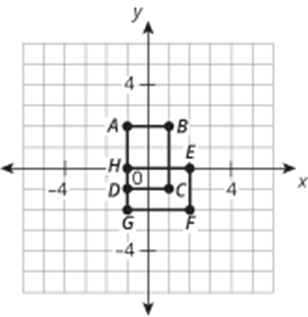
rotate Rectangle ABCD 90 degrees clockwise about the origin, then translate it 1 unit down.
Triangle HIJ with coordinates H(4,-2), I(7,-3), and J (6,-5) maps onto KLM with coordinates K (7-6), L (10,-7), and M (9,-9).
Translate 3 right 4 down
Figure WXYZ has the following ordered pairs W(1,1), X(2,2), Y(3,1), and Z(4,2). How can you reflect the figure to move from Quadrant I to Quadrant II. List the reflected ordered pairs.
Reflection across y axis
W'(-1,1)
X' (-2,2)
Y' (-3,1)
Z' (-4,2)
Troy drew a triangle with coordinates (5,6), (5,4) and (8,4). He rotated the triangle 180 degrees about the origin. Which could be a pair of coordinates of the image? Select all that apply.
(–5, 6)
(–5, –4)
(–5, –6)
(–8, –4)
(–5, –4) *
(–5, –6) *
(–8, –4) *
Cora drew square ABCD. Then, she drew the image of it, square A'B'C'D', 2 centimeters to the right of the original figure. Line segment BC is 3 centimeters. Line Segment B'C' is 5 cm.
False, line segment B'C' is 3 cm.
WRONG ANSWER LOSES 400 POINTS
Triangle RUG ≅ Triangle CAR. Identify all of the congruent sides.
RU ≅ CA
UG ≅ AR
RG ≅ CR
Describe the sequence of transformations maps triangle ABC onto triangle DEF? 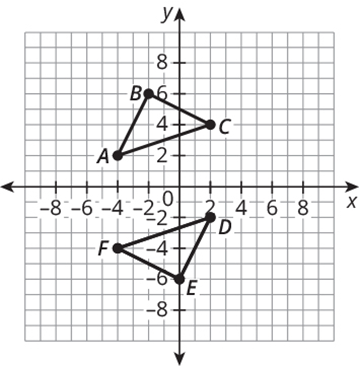
Rotate 180 degrees about origin, then translate left 2 units.
Use the coordinates to determine the transformation or sequence of transformations used to map the first triangle onto the second. Triangle EFG with coordinates E(-4,2), F(-2,1), G (-1,-3) maps onto triangle XYZ with coordinates X(4,4), Y (2,3), and Z (1,-1).
WRONG ANSWER LOSES 250 POINTS
Reflections across y, then translate 2 units up.
Use the coordinates to determine the transformation or sequence of transformations used to map the first triangle onto the second triangle.
Triangle ABC with coordinates A(7,9) B (8,4), and C (7,6) maps onto triangle DEF with coordinates D(-9,7), E (-4,8), and F (-6, 7).
TRIPLE POINTS
Triangle ABC rotates 90 degrees counterclockwise about the origin to create triangle DEF.
Triangle ABC has ordered pairs A (-5,-5), B (-10,-10), and C (-1,-10). Amelia rotates triangle ABC 90 degrees clockwise. The ordered pairs for triangle A'B'C' are as follows: A'(5,-5), B'(-10,10), and C' (1, 10)
False. A 90 degree rotation clockwise would changed the ordered pairs as follows: (x,y)= (y,-x)
A' (-5,5)
B' (-10,10)
C' (-10, 1)
L' (-4,5)
M' (-6,9)
N' (-1,9)
O' (-2,5)